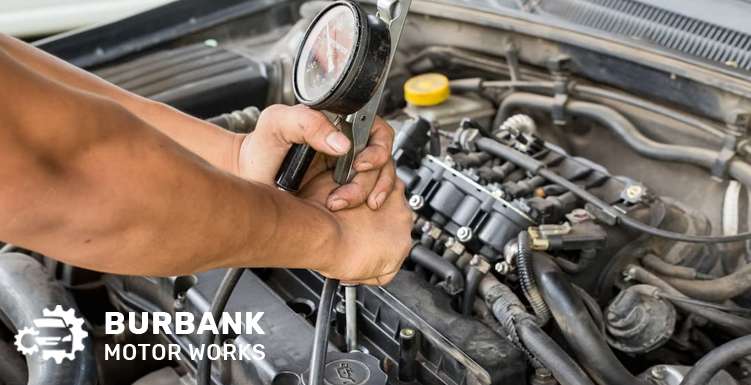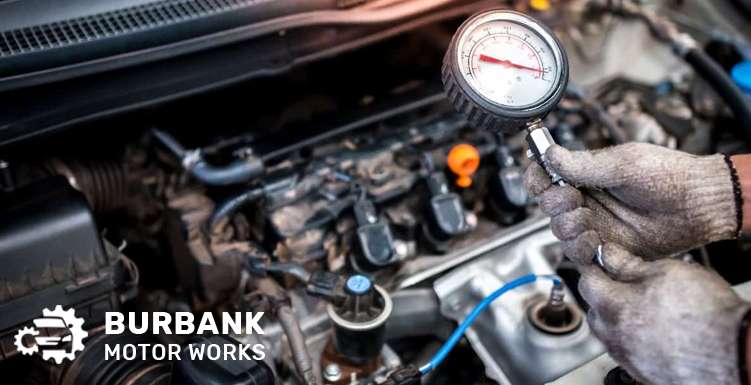
Address: 2208 W Burbank Blvd, Burbank, CA 91506

Mon - Fri: 7:45 Am - 5:30 Pm
Sat: 8:00 Am - 2:30 Pm
Sun: Closed

Address: 2208 W Burbank Blvd, Burbank, CA 91506

Mon - Fri: 7:45 Am - 5:30 Pm
Sat: 8:00 Am - 2:30 Pm
Sun: Closed
Engine compression is very important for a car to run well. It helps the engine create the power needed to move the car. When compression is low, the engine may not work right. The car might lose power, run rough, or even stop working. One common cause of low compression is a problem with the cylinder head. The cylinder head helps seal the combustion chamber, where the fuel and air mix and burn to create power. When the cylinder head is damaged, repair is necessary to prevent low compression.
Fixing the cylinder head is one way to restore engine compression. By fixing the cylinder head, you can help the engine get back to running smoothly. Let’s explain what the cylinder head does, how it can get damaged, and how to fix it. We’ll also look at how to know if the cylinder head needs repair and what you can do to keep it in good shape.

The cylinder head is a very important part of the engine. It sits on top of the engine block and covers the cylinders. Inside the cylinder head, there are several parts that work together to help the engine run.
Here are some key parts found in the cylinder head:
The cylinder head has several important jobs:
Cylinder heads can get damaged for several reasons. When this happens, it can cause low compression in the engine.
One of the most common causes of cylinder head damage is overheating. When the engine gets too hot, the cylinder head can warp or crack. This can cause the seal between the cylinder head and the engine block to break, leading to low compression.
The head gasket is a seal that sits between the cylinder head and the engine block. It helps keep the combustion chamber sealed. If the head gasket blows, it can cause the engine to lose compression.
Over time, the parts inside the cylinder head can wear out. The valves might not seal properly, or the camshaft might get damaged. This can lead to low compression.
Sometimes, the cylinder head can get damaged by an impact, like if something hits the engine. This can cause cracks or other damage that leads to low compression.
There are some signs that can tell you if the cylinder head might have a problem. If you notice any of these, it’s important to check the cylinder head.
If the engine doesn’t have as much power as it used to, it could be a sign of low compression. This might happen if the cylinder head is damaged or if the head gasket has blown.
If the engine shakes or runs rough when the car is idling, it could be because of a problem with the cylinder head. This can happen if the valves aren’t sealing properly or if there’s a crack in the cylinder head.
White smoke coming from the exhaust can be a sign that coolant is leaking into the combustion chamber. This can happen if the cylinder head is cracked or if the head gasket is blown.
If the engine keeps overheating, it could be because the cylinder head is damaged. A warped or cracked cylinder head can cause the engine to lose coolant, leading to overheating.
If you think the cylinder head might be damaged, there are some tests that can help confirm the problem.
A compression test measures the pressure inside the cylinders. If one or more cylinders have low compression, it could be a sign that the cylinder head is damaged.
A leak-down test can help find out where the compression is leaking. During this test, compressed air is put into the cylinder, and then it’s checked to see where the air is escaping. If the air is coming out of the intake or exhaust, it could be because of a problem with the cylinder head.
Sometimes, you can see damage to the cylinder head just by looking at it. Cracks, warping, or signs of coolant leaks can often be seen with a visual inspection.
A chemical test can check if there are exhaust gases in the coolant. This can be a sign that the head gasket is blown or that the cylinder head is cracked.
If the cylinder head is damaged, it may need to be repaired or replaced. Here’s how a cylinder head repair is usually done.
The first step is to remove the cylinder head from the engine. This can be a big job, as many parts need to be taken off to get to the cylinder head. Once the cylinder head is removed, it can be inspected more closely for damage.
The cylinder head is carefully inspected for cracks, warping, and other damage. Special tools are used to check if the cylinder head is flat. If the cylinder head is warped, it might need to be machined to make it flat again.
If the cylinder head is cracked or too damaged, it might need to be replaced. If the damage is not too bad, the cylinder head can often be repaired. This might involve welding cracks or replacing worn-out parts like valves or camshafts.
Once the cylinder head is repaired or replaced, it’s put back on the engine. A new head gasket is usually installed to make sure the combustion chamber is sealed. The cylinder head bolts are tightened in a special pattern to make sure the cylinder head sits evenly on the engine block.
After the cylinder head is reassembled, the engine is tested to make sure the repair was successful. A compression test might be done again to check that the compression is back to normal.

There are some things you can do to help prevent cylinder head problems and keep your engine running well.
Keeping up with regular maintenance is one of the best ways to prevent cylinder head problems. This includes changing the oil, replacing the air filter, and getting tune-ups. Regular maintenance helps keep the engine cool and running smoothly, which can prevent damage to the cylinder head.
Make sure the engine has enough coolant and that the coolant is in good condition. Low or dirty coolant can cause the engine to overheat, which can damage the cylinder head. Check the coolant regularly and replace it as needed.
If the engine starts to overheat, it’s important to address the problem right away. Ignoring overheating can lead to serious damage to the cylinder head. If the temperature gauge is higher than normal or if you see steam coming from the engine, stop driving and check the engine.
Don’t push the engine too hard, like towing heavy loads or driving in extreme conditions without proper preparation. Overloading the engine can cause it to overheat and damage the cylinder head.
If a bad cylinder head is not repaired, it can cause bigger problems for the engine.
A damaged cylinder head can lead to engine failure if it’s not repaired. Low compression can cause the engine to lose power, run rough, or stop working altogether. This can leave you stranded and needing a costly engine replacement.
A bad cylinder head can cause the engine to burn more fuel, leading to increased pollution. This not only harms the environment but can also cause the car to fail emissions tests. In some places, this could mean you can’t legally drive the car until it’s fixed.
A car with a bad cylinder head might not run as well as it should. You might notice a loss of power, rough idling, or even stalling. These issues can make driving less safe and less enjoyable.
While some cylinder head repairs can be done at home, others may require professional help. If you’re not sure how to diagnose or repair a cylinder head problem, it’s a good idea to take the car to a mechanic. They have the tools and experience to fix the problem correctly.
A cylinder head can crack due to overheating, impact damage, or old age. When the engine gets too hot, the metal can expand and crack. Impact damage from something hitting the engine can also cause cracks.
Signs of a warped cylinder head include overheating, loss of power, and white smoke from the exhaust. A mechanic can check for warping by using a special tool to measure if the cylinder head is flat.
Yes, a blown head gasket can cause low compression. The head gasket seals the combustion chamber. When it’s blown, it can let air escape, leading to low compression.
If your car is overheating, stop driving and turn off the engine. Let the engine cool down before checking the coolant level. If the coolant is low, add more. If the car continues to overheat, there may be a problem with the cylinder head, and you should get it checked.
Understanding the importance of the cylinder head and how to care for it is key to keeping your engine in good shape. By knowing the signs of cylinder head problems and how to fix them, you can help ensure your car runs smoothly and avoid bigger issues down the road. Regular maintenance and paying attention to warning signs can help extend the life of your cylinder head and keep your engine performing at its best.
Call us for booking an early appointment and get all your car related problems solved by our experts.